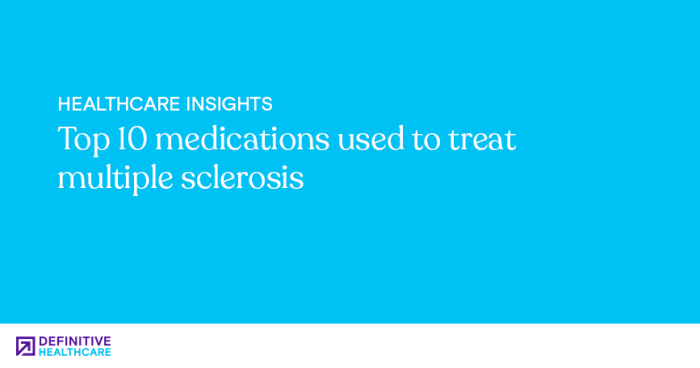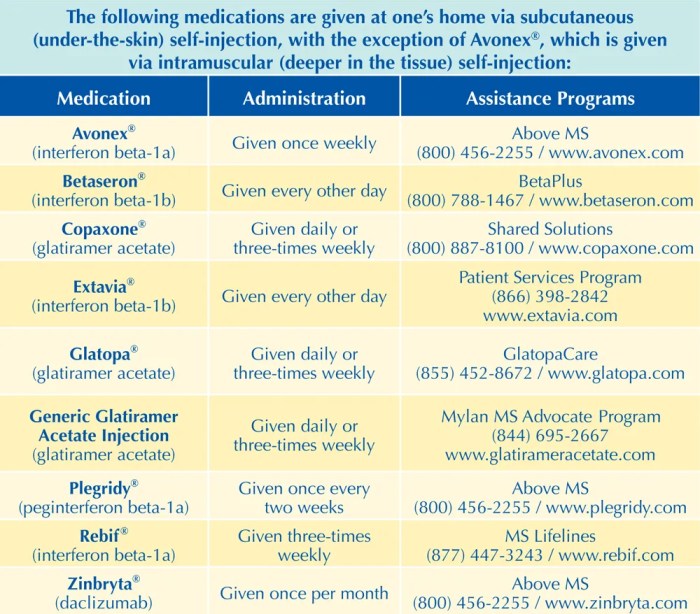Exploring the realm of Best Multiple Sclerosis Treatments Approved Worldwide, this introduction delves into the significance of approved treatments for MS patients globally. From disease-modifying therapies to alternative and complementary treatments, this guide offers a detailed overview of the diverse options available to manage multiple sclerosis effectively.
As we navigate through the various treatment modalities, we will uncover the goals of MS treatments and how they adapt based on the progression of the disease. Get ready to embark on a journey towards understanding the best approaches to combat multiple sclerosis worldwide.
Overview of Multiple Sclerosis Treatments
Multiple Sclerosis (MS) is a complex autoimmune disease that affects the central nervous system, leading to various symptoms and disabilities. Approved treatments worldwide play a crucial role in managing the condition and improving the quality of life for MS patients.
Types of Treatments
- Disease-Modifying Therapies:These medications aim to reduce the frequency and severity of relapses, slow down the progression of MS, and prevent new lesions in the brain and spinal cord.
- Symptomatic Treatments:These therapies focus on managing specific symptoms of MS, such as fatigue, muscle spasticity, pain, and cognitive issues, to enhance daily functioning and comfort.
- Rehabilitation Therapies:Physical therapy, occupational therapy, and speech therapy are essential components of MS treatment to improve mobility, strength, coordination, and speech abilities.
Goals of MS Treatments
The goals of MS treatments vary based on the stage and progression of the disease. The primary objectives include:
- Reducing the frequency and severity of relapses to prevent permanent neurological damage.
- Slowing down the progression of disability and improving overall quality of life.
- Managing symptoms effectively to enhance daily functioning and well-being.
Disease-Modifying Therapies (DMTs)
Disease-Modifying Therapies (DMTs) are a crucial component of multiple sclerosis (MS) treatment, aimed at reducing disease activity, delaying progression, and improving overall quality of life for patients. These therapies work by targeting the underlying immune system dysfunction that leads to damage of the central nervous system in MS.
Types of Disease-Modifying Therapies
- Injectable DMTs: Injectable medications such as interferons and glatiramer acetate are among the earliest approved DMTs for MS. They work by modulating the immune response to reduce inflammation and prevent relapses.
- Oral DMTs: Oral medications like fingolimod and dimethyl fumarate offer convenience for patients compared to injectables. These drugs also target the immune system to reduce disease activity.
- Infusion Therapies: Infusion treatments like natalizumab and ocrelizumab are administered intravenously and are reserved for more aggressive forms of MS. They work by targeting specific immune cells involved in the disease process.
Mechanisms of Action of Popular DMTs
- Interferons: Interferon-based therapies help regulate the immune system by reducing the production of pro-inflammatory molecules, thereby decreasing inflammation in the central nervous system.
- Glatiramer Acetate: This drug is thought to work by modifying immune responses, potentially shifting them towards anti-inflammatory pathways to protect nerve cells.
- Fingolimod: Fingolimod traps immune cells in lymph nodes, preventing them from entering the brain and causing damage, thus reducing relapses in MS patients.
- Natalizumab: Natalizumab blocks immune cells from crossing the blood-brain barrier, limiting their ability to cause inflammation and damage in the central nervous system.
Symptomatic Treatments for Multiple Sclerosis
Symptomatic treatments are aimed at managing specific symptoms of multiple sclerosis (MS) to improve the quality of life for patients. These treatments differ from disease-modifying therapies (DMTs) as they do not target the underlying disease process but rather address the symptoms themselves.
Pain Management
- Medications such as nonsteroidal anti-inflammatory drugs (NSAIDs) or anticonvulsants may be prescribed to help alleviate pain associated with MS.
- Physical therapy, massage, or acupuncture can also be beneficial in managing pain and improving mobility.
Spasticity Treatment
- Muscle relaxants like baclofen or tizanidine are commonly used to reduce muscle stiffness and spasms in MS patients.
- Physical therapy, stretching exercises, or splinting can help improve muscle flexibility and reduce spasticity.
Bladder Dysfunction Management
- Medications such as anticholinergics may be prescribed to manage bladder issues like urinary urgency or incontinence.
- Behavioral therapies, pelvic floor exercises, or catheterization techniques can also help in controlling bladder dysfunction.
Cognitive Impairment Interventions
- Cognitive rehabilitation programs or memory aids can assist MS patients in coping with cognitive deficits and improving mental function.
- Speech therapy or occupational therapy may be recommended to address communication and daily living challenges associated with cognitive impairment.
Alternative and Complementary Therapies

Alternative and complementary therapies are often used alongside traditional treatments for multiple sclerosis to help manage symptoms and improve overall well-being.
Acupuncture
Acupuncture involves the insertion of thin needles into specific points on the body to help alleviate pain and improve energy flow. Some people with MS report benefits such as reduced pain, fatigue, and muscle stiffness after acupuncture sessions.
Yoga and Meditation
Yoga and meditation practices can help individuals with MS reduce stress, improve flexibility, and enhance overall mental well-being. These mind-body practices may also help manage symptoms like fatigue and depression commonly associated with MS.
Dietary Supplements
Some individuals with MS use dietary supplements such as vitamin D, omega-3 fatty acids, and antioxidants to support their immune system and overall health. While research on the effectiveness of supplements for MS is ongoing, some studies suggest that certain supplements may have benefits for symptom management.
Cannabis-Based Products
Cannabis-based products, such as medical marijuana, have gained attention for their potential to help manage symptoms like pain, muscle spasticity, and sleep disturbances in MS. However, it's essential to consult with a healthcare provider before using these products due to potential risks and legal considerations.
Final Review

In conclusion, the world of multiple sclerosis treatments is vast and constantly evolving. By exploring the best treatments approved worldwide, individuals with MS can make informed decisions about their healthcare journey. Whether opting for disease-modifying therapies or exploring alternative treatments, the goal remains the same – to enhance the quality of life for those affected by multiple sclerosis.
General Inquiries
What are the common goals of MS treatments?
The common goals of MS treatments include reducing relapses, managing symptoms, slowing disease progression, and enhancing overall quality of life for patients.
How do symptomatic treatments differ from disease-modifying therapies?
Symptomatic treatments focus on managing specific symptoms of MS to improve day-to-day functioning, while disease-modifying therapies aim to alter the course of the disease itself.
Are alternative therapies effective in managing MS symptoms?
While some alternative therapies may offer symptom relief for MS patients, it's essential to consult with healthcare providers to ensure safety and effectiveness.









